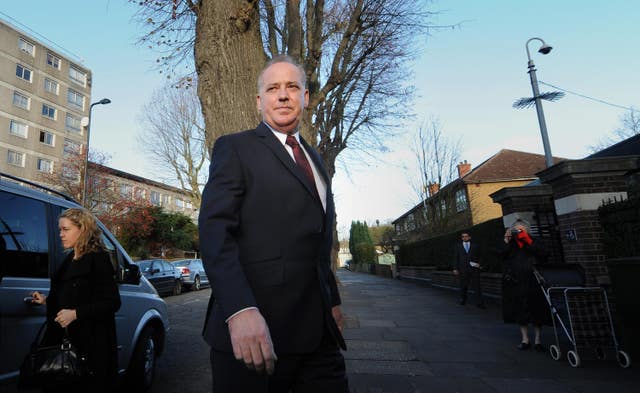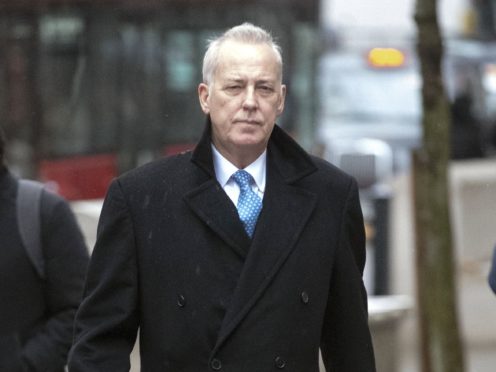Police have won a challenge against a decision paving the way for entertainer Michael Barrymore to receive substantial damages over the wrongful arrest he says destroyed his career.
The comedian and TV presenter, who values his claim against Essex Police at more than £2.4 million, was not present at the Court of Appeal in London on Wednesday to hear three judges rule in favour of the force on the level of compensation he is entitled to.
The force argued 66-year-old Barrymore should only get a “nominal” payout and challenged a High Court ruling made in August last year that he was entitled to “more than nominal” damages.
Sir Brian Leveson, Lady Justice Hallett and Sir Ernest Ryder allowed an appeal by the Chief Constable of Essex Police.
Announcing the decision of the court, Sir Brian declared Barrymore “is entitled to nominal damages only”.
The star launched a High Court damages action after he was arrested and detained in June 2007 on suspicion of the rape and murder of 31-year-old Stuart Lubbock, who was found in the swimming pool at his home in Roydon, Essex, six years earlier.

Barrymore, who brought his legal action against the police for wrongful arrest and false imprisonment under his real name Michael Ciaran Parker, puts his compensation claim at more than £2.4 million in lost earnings.
No decision has yet been made on the sum he will eventually receive as the litigation has so far centred on the preliminary issue of whether it should be nominal or substantial.
The force argued that if Barrymore is entitled to substantial damages it would have wide-reaching implications for the police service and other organisations facing similar claims, particularly from wealthy or famous individuals.
Lord Faulks QC, for the Chief Constable, told the three judges during appeal proceedings last month that High Court judge Mr Justice Stuart-Smith had “erred” in his approach to the law.
Lord Faulks said that although the focus of the appeal was on Essex Police and Barrymore, “we should not lose sight of the fact that a young man died”.
He added: “His family, as well as their distress at this young man’s death, have never obtained a true explanation for it.”
Essex Police admitted the arrest was unlawful as the arresting officer did not have reasonable grounds to suspect Barrymore was guilty of any offence.
At the High Court, the force submitted Barrymore could have been lawfully arrested by another officer, meaning that only an award of nominal damages should be made, rather than the “substantial” sum sought by the star.
But Mr Justice Stuart-Smith ruled the defendant, the Chief Constable, had failed to prove that if not arrested unlawfully as he was, Barrymore “could and would have been arrested lawfully”.
He said there was “information available to the police that could have provided an arresting officer with reasonable grounds for a lawful arrest”.

But there was only one designated arresting officer who had sufficient information and had been sufficiently briefed to enable her to arrest him lawfully, and she was not present.
Hugh Tomlinson QC, for Barrymore, had told the High Court judge the presenter was never charged with any offence and the Crown Prosecution Service (CPS) later made it “crystal clear” there was no basis for any charges.
At the Court of Appeal, Mr Tomlinson argued the High Court judge “should have held that the defendant had not established that any police officer had reasonable grounds for believing that it was necessary” to arrest Barrymore.
Mr Tomlinson told the appeal judges the “original incident” had a “devastating” effect on Barrymore’s career.
Then there was a highly-publicised inquest, he said, adding: “There is no doubt that something terrible happened to this young man.
“As to what actually happened, no-one has ever been able to find out.”
That was “very, very regrettable”, and everyone is “wholly sympathetic to his family”.
Mr Tomlinson said: “The claimant then rebuilt his career, and was rebuilding his career, and then comes this arrest, which puts him, on his case, entirely back to square one.
“He has never been able to rebuild his career since.”
Mr Lubbock’s body was found in the pool after a party where drugs and alcohol were consumed.
A post-mortem examination revealed he had suffered serious anal injuries.
In 2002, an open verdict was recorded at the inquest into his death.
Sir Brian said the High Court judge was correct to conclude that “there were reasonable grounds both to suspect Mr Parker of committing an offence and that it was necessary to arrest him”.
He added: “Equally, however, I have no doubt that had things been done as they should have been done … a lawful arrest would have been effected.”
